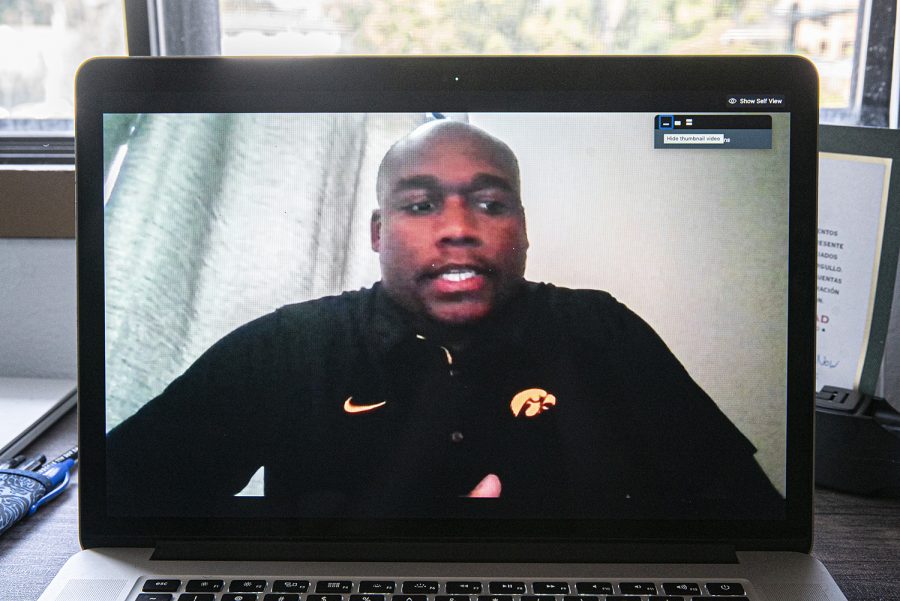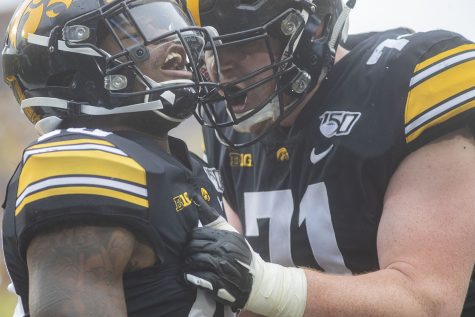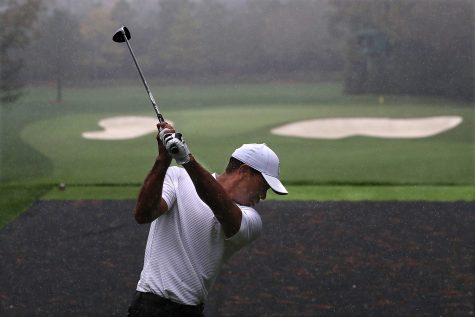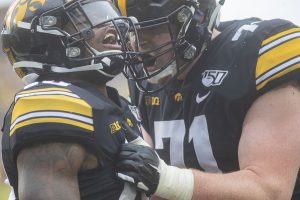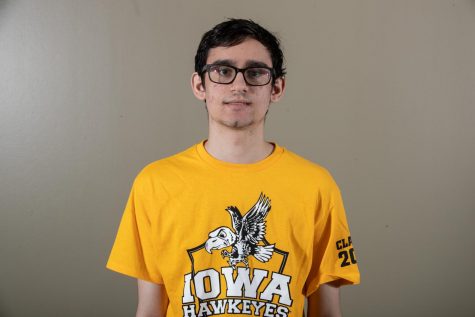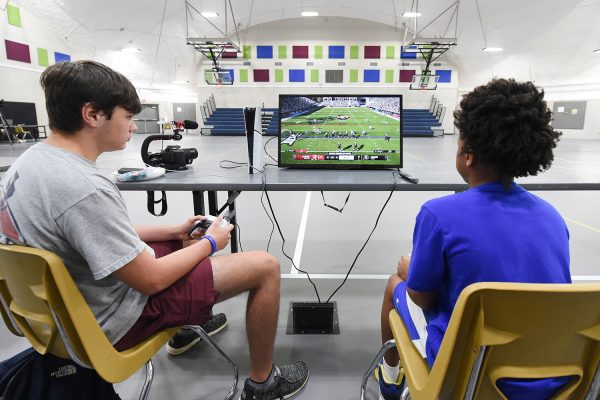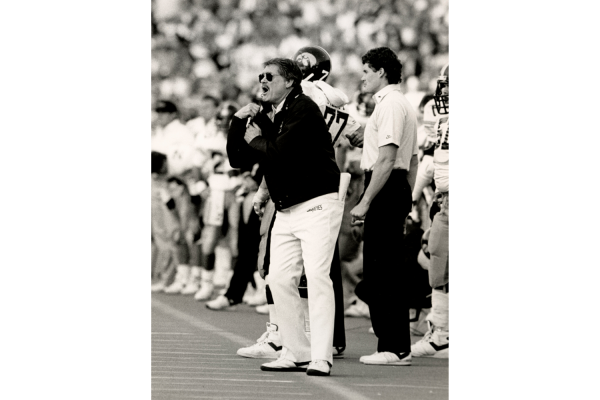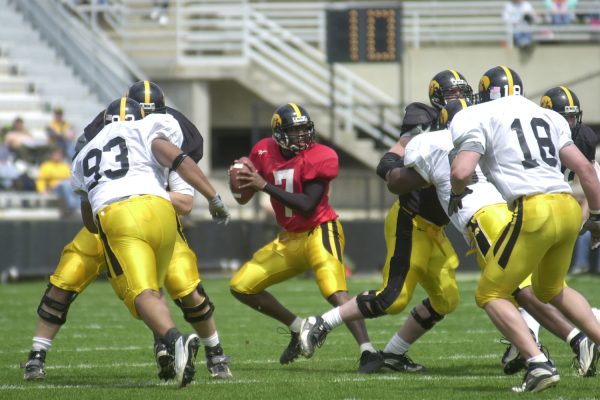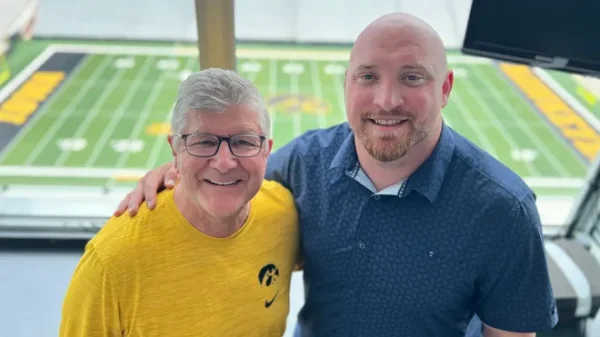Iowa CLAS hosts UI Athletics and Race webinar
Three roundtable participants discussed the intersection between race and sport.
Executive Director of Diversity, Equity, and Inclusion for UI Athletics, Broderick Binns, sits down for an interview over Zoom on Tuesday, August 25, 2020.
November 12, 2020
The University of Iowa College of Liberal Arts and Sciences hosted a Zoom webinar regarding Iowa Athletics and Race Wednesday night. The importance of unity in sport was the highlight of the discussion.
Alexis Sevillian, a senior on the Iowa women’s basketball team and the diversity and inclusion chair of the Iowa Student-Athlete Committee, served as a roundtable panelist.
“I don’t think you’re able to reach that full potential or reach your capabilities if you’re not able to come together and unify, understand racism,” Sevillian said. “Understand what racism has done within our country or be able to, like I said, achieve that success that you are capable of. Just being able to appreciate what each of your teammates are able to bring in, enjoy who they are for who they are.”
Sevillian is also a representative on the Big Ten Anti-Hate and Anti-Racism Coalition, which was formed earlier this year. Sevillian said the representatives bounce ideas off of each other to make each university more diverse and inclusive.
The Iowa football program has dealt with concerns regarding social justice, racism, and equity since former Hawkeyes alleged that there were racial disparities within the program and that Black players were treated unfairly.
In the end, Iowa reached a $1.1 million separation agreement with longtime strength and conditioning coach Chris Doyle as various Black former players shared the negative experiences they had with Doyle.
Most recently, eight former Iowa football players demanded financial compensation and the removal of head football coach Kirk Ferentz, offensive coordinator Brian Ferentz, and Athletics Director Gary Barta as repayment for the negative experiences they had during their time with Iowa football.
Current Hawkeyes have continued to make their voices heard and promote social justice by kneeling during the national anthem prior to the kickoff of football games.
The concerns surrounding Iowa football were not discussed directly during the roundtable event.
Sevillian said there are Black and LGBTQ+ groups for athletes on campus to utilize. Iowa also recently formed a multicultural focus group headed by former Hawkeye football player and newly-named Executive Director of Diversity, Equity, and Inclusion for Iowa Athletics Broderick Binns.
Binns moderated the CLAS roundtable Wednesday evening. The roundtable was advertised as “an attempt to contextualize the current moment by examining past challenges and considering future opportunities.”
Quinn Early – another roundtable member – played football at Iowa from 1984-87. He is the writer and producer of a planned film about the first Black athlete at Iowa, Frank Holbrook, who joined the football team in 1895. Early said a website for the film, which will be titled “The Shoulders of Giants,” will be coming out soon.
Early said when racism presents itself, it’s about how you deal with it. One time at practice, a coach slapped him on the helmet when he was frustrated with him.
“I was extremely upset, but what I did was after practice, I went into his office and knocked on the door,” Early said. “I went in, I sat down with him, and we talked, and I said, ‘You know, I understand I didn’t do what I was supposed to be doing, I’m learning.’ I said, ‘There’s never an instance where you need to put your hands on me.’ And he apologized. And then we had a mutual respect.”
Louis Moore – an associate professor of history at Grand Valley State University – also participated in the roundtable.
His book, “We Will Win the Day: The Civil Rights Movement, the Black Athlete, and the Quest for Equality” is about the role Black activist athletes have played in history and society. He co-hosts The Black Athlete podcast.
Moore highlighted the similarities of athlete activism now compared to the Civil Rights Movement, such as athletes not being at the forefront at first.
“Seeing a mass movement on one hand gives you cover, but also inspires other people, right?” Moore said. “And then we can see in a post-2012 world when you have a development of Black Lives Matter, not just an org but across the nation you’ll see more and more athletes get involved because those mass protests cover, right?”
Moore said, after the death of George Floyd, everyone was out on the street fighting for what they believed in, and athletes just couldn’t stay home.



